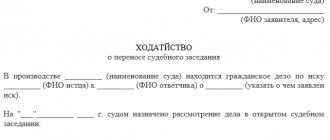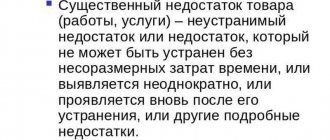Commentary on Article 41 of the Civil Procedure Code
The article under comment establishes the conditions for replacing an improper defendant.
The provisions of the commented article establish that replacement of an improper defendant is possible at the request or with the consent of the plaintiff. Moreover, after replacing an improper defendant with a proper one, preparation and consideration of the case are carried out from the very beginning.
If the plaintiff does not agree to replace the defendant, the court considers the case based on the claim.
If the participation of an improper defendant is proven, the claim must be refused.
According to the explanations given in paragraph 23 of the Resolution of the Plenum of the Supreme Court of the Russian Federation dated June 24, 2008 No. 11 On the preparation of civil cases for trial” (as amended on February 9, 2012), “if, during the preparation of the case, the judge comes to the conclusion, that the claim is brought against the wrong person who should answer the claim, he, in compliance with the rules of Article 41 of the Code of Civil Procedure of the Russian Federation, at the request of the defendant, can replace the defendant. Such replacement is made at the request or with the consent of the plaintiff. After replacing an inappropriate defendant, preparation of the case is carried out from the very beginning. If the plaintiff does not agree to replace the improper defendant with another person, the preparation of the case and then its consideration are carried out on the basis of the presented claim. When a claim is brought against some of the defendants, the court does not have the right, on its own initiative and without the consent of the plaintiff, to involve the remaining defendants in the case as co-defendants. The court is obliged to resolve the case according to the claim that is brought, and only in relation to those defendants who are indicated by the plaintiff. Only if it is impossible to consider the case without the participation of the co-defendant or co-defendants due to the nature of the disputed legal relationship, the court invites him or them to participate in the case on its own initiative (Part 3 of Article 40 of the Code of Civil Procedure of the Russian Federation). The reasons why the court found it impossible to consider this case without the specified persons must be given in the ruling, a copy of which, together with a copy of the statement of claim, is sent to the involved persons.
When replacing an improper defendant with a proper one, it must be taken into account that the case can be considered by the same court if, taking into account the new defendant, its jurisdiction has not changed.
If the jurisdiction of the case has changed (for example, the defendant is in the jurisdiction of another court), the case, based on the provisions enshrined in Part 1 of Article 47 of the Constitution of the Russian Federation, must be transferred to the court that has jurisdiction over it.
Another comment on Art. 41 of the Civil Procedure Code of the Russian Federation
The Civil Procedure Code of the Russian Federation provides for the possibility of replacing an inappropriate defendant. The replacement of an inappropriate defendant can only be done with the consent of the plaintiff. The release of the defendant from participation in the case without the consent of the plaintiff is contrary to the principle of discretion. If the plaintiff does not agree to replace the improper defendant with another person, the court considers the case based on the claim. The law does not give the court the right to independently involve another person in the process as a proper defendant. The defendant is replaced during the preparation of the case or during its trial in the court of first instance.
After replacing an improper defendant with a proper one, the court is obliged to prepare the case again and begin its consideration from the very beginning. The procedural law's indication that after replacing an improper defendant with a proper one, the process must proceed from the very beginning is of fundamental importance. Everything that an improper defendant did in the process cannot have legal significance for the proper defendant.
Inappropriate defendant in civil proceedings of the Civil Code of the Russian Federation
- Car insurance
- Housing disputes
- Land disputes
- Administrative law
- Participation in shared construction
- Family disputes
- Civil law, Civil Code of the Russian Federation
- Consumer rights Protection
- Labor disputes, pensions
- home
- Article 41 of the Code of Civil Procedure of the Russian Federation. Replacing an inappropriate defendant
Civil Procedure Code of the Russian Federation:
Article 41 of the Code of Civil Procedure of the Russian Federation. Replacing an inappropriate defendant
1. When preparing a case or during its trial in a court of first instance, the court may allow, at the request or with the consent of the plaintiff, the replacement of an inappropriate defendant with an appropriate one. After replacing an improper defendant with a proper one, preparation and consideration of the case are carried out from the very beginning.
2. If the plaintiff does not agree to replace the inappropriate defendant with another person, the court will consider the case based on the brought claim.
Change of participant during civil proceedings
According to Art. 41 of the Code of Civil Procedure of the Russian Federation, it is permissible to replace an improper defendant in civil proceedings. This procedure allows you to expedite the consideration of a previously filed claim without filing a secondary one. The outcome of the case itself often directly depends on how correctly the defendant was identified in civil proceedings.
This is interesting: Cash payments to children of war
In order for a change of opponent to occur, it is necessary to file a corresponding petition to replace the improper defendant. The petition may be filed either by the plaintiff or by a representative of a third party directly involved in the proceeding. Consideration of the petition rests with the judge, who will make a reasoned decision in this regard after examining all aspects of the case.
Important: the plaintiff in civil proceedings must agree to the replacement. Otherwise, consideration of the claim can only take place with the original composition.
Comments on Article 41 of the Code of Civil Procedure of the Russian Federation, judicial practice of application
Replacement of the defendant at the request or on the initiative of the court
If, during the preparation of the case, the judge comes to the conclusion that the claim has been brought against the wrong person who should be liable for the claim, he, in compliance with the rules of Article 41 of the Code of Civil Procedure of the Russian Federation, at the request of the defendant, can replace the defendant. Such replacement is made at the request or with the consent of the plaintiff. After replacing an inappropriate defendant, preparation of the case is carried out from the very beginning. If the plaintiff does not agree to replace the improper defendant with another person, the preparation of the case and then its consideration are carried out on the basis of the presented claim. When a claim is brought against some of the defendants, the court does not have the right, on its own initiative and without the consent of the plaintiff, to involve the remaining defendants in the case as co-defendants. The court is obliged to resolve the case according to the claim that is brought, and only in relation to those defendants who are indicated by the plaintiff. Only if it is impossible to consider the case without the participation of the co-defendant or co-defendants due to the nature of the disputed legal relationship, the court invites him or them to participate in the case on its own initiative (Part 3 of Article 40 of the Code of Civil Procedure of the Russian Federation). The reasons why the court found it impossible to consider this case without the specified persons must be given in the ruling, a copy of which, together with a copy of the statement of claim, is sent to the involved persons.
When replacing an improper defendant with a proper one, it must be taken into account that the case can be considered by the same court if, taking into account the new defendant, its jurisdiction has not changed.
If the jurisdiction of the case has changed (for example, the defendant is in the jurisdiction of another court), the case, based on the provisions enshrined in Part 1 of Article 47 of the Constitution of the Russian Federation, must be transferred to the court that has jurisdiction over it.
The replacement of an improper defendant and the actions associated with the replacement must be reflected in the protocol. The protocol for performing procedural actions must comply with the requirements of Articles 229 and 230 of the Code of Civil Procedure of the Russian Federation. These actions should be performed according to the rules of Article 152 of the Code of Civil Procedure of the Russian Federation.
This is interesting: What can you rent for money?
Improper defendant
The Civil Procedure Code of the Russian Federation also points to such a basis when the subject of the dispute is homogeneous rights and obligations. This basis can be called procedural. For example, claims for recovery of wages brought by several employees against one employer. They can be combined into one case, since the subject of the dispute is homogeneous circumstances (work performed and accrued wages). If it is impossible to consider the case without the participation of the co-defendant or co-defendants due to the nature of the disputed legal relationship, the court invites him or them to participate in the case on its own initiative. After the involvement of a co-defendant or co-defendants, preparation and consideration of the case are carried out from the very beginning.
Article 41 of the Code of Civil Procedure of the Russian Federation. Replacing an inappropriate defendant
Text of Article 41 of the Code of Civil Procedure of the Russian Federation in the new edition.
1. When preparing a case or during its trial in a court of first instance, the court may allow, at the request or with the consent of the plaintiff, the replacement of an inappropriate defendant with an appropriate one. After replacing an improper defendant with a proper one, preparation and consideration of the case are carried out from the very beginning.
2. If the plaintiff does not agree to replace the inappropriate defendant with another person, the court will consider the case based on the brought claim.
N 138-FZ, Code of Civil Procedure of the Russian Federation, current edition.
Article 41 of the Code of Civil Procedure of the Russian Federation
I made demands also on the administration. But they submitted a response to the process that they are not proper defendants, because they are not the owners of the disputed property and are not the owners of the land plot where it is located. Tell me, is this all being done to confuse the threads of the process or for what? If there are no defendants, then that means there shouldn’t be a claim, and I need to go to a special office to establish the legal facts of recognizing the thing as ownerless and my possession and use of this thing? No one knows what to do next, not the judge, not the Internet, not me. Can you advise which path to choose next and how to proceed? After replacing an inappropriate defendant, one or more co-defendants may participate in the case. However, the action to replace an inappropriate co-defendant is different from the action to add a co-defendant. In this case, the improper defendant is excluded from the number of persons participating in the case, and the plaintiff’s claims against him are not considered by the court.
Commentary to Art. 41 of the Civil Procedure Code of the Russian Federation
Comments on the articles of the Code of Civil Procedure will help you understand the nuances of civil procedural law.
1. Proper parties are citizens and organizations that have a subjective (personal) legal interest in resolving a legal dispute. To be a proper party in a particular case, it is necessary to be the subject of a controversial material legal relationship. But at the time of initiation of proceedings in a civil case, the judge is not able to determine whether the parties are proper, and cannot, on this basis, refuse to accept the statement of claim. Consequently, recognizing the party as proper at this moment can only be assumed. It is the presumptive connection of a certain person with a controversial material legal relationship that determines the ability not to process in general (which is typical for civil procedural legal capacity), but the ability to be a party in one or another specific legal proceeding.
The essence of replacing an improper party is the activity of the court to consider a dispute about the right in a new subject composition and (this is the main thing) taking such measures when the replacement as such is carried out. The court should strive to have the improper party withdraw from the process and the proper party to take its place, i.e. so that the replacement takes place.
The institution of replacing an improper party was also known to the previous civil procedural legislation, but the Code of Civil Procedure introduced changes to the content and rules for its implementation.
Previously Art. 36 of the Code of Civil Procedure of the RSFSR of 1964 provided for the possibility, under certain conditions, of replacing both an improper plaintiff and an improper defendant. This was fully consistent with the active role of the court, which by law it was supposed to occupy in civil proceedings. Significant changes that have occurred in recent years in the life of Russian society have required corresponding changes in the legal regulation of the activities of the court in the administration of justice. The changes and additions made to the Code of Civil Procedure of the RSFSR in 1995 and 2000 affected a significant part of the code and, in particular, such fundamental principles of civil procedural law as the principles of discretion, adversariality, and procedural equality of the parties. The court was freed from unjustified interference in procedural relations and the activities of the disputants.
In accordance with Art. 41 of the Code of Civil Procedure only the replacement of an improper defendant is allowed. An indispensable condition for replacing an improper defendant with an appropriate one is the plaintiff’s request for replacement or his consent to replacement, if the replacement is made at the initiative of the court. In cases of some categories, the proper defendant is determined by law (see, for example, Articles 1068, 1069 of the Civil Code).
For example, according to civil law, the right to claim property from someone else’s illegal possession belongs only to the alleged owner of the thing being vindicated (Article 301 of the Civil Code), its title owner (Article 305 of the Civil Code), as well as the long-standing owner (clause 2 of Article 234 of the Civil Code), therefore all other persons, if they present vindication claims, will be improper plaintiffs.
In accordance with Art. 1079 of the Civil Code, the defendant for harm caused by a source of increased danger is not the actual causer of harm, but the owner of the source of increased danger (the owner of the car).
According to Art. 1071 of the Civil Code in cases where, according to the Civil Code or other laws, the damage caused is subject to compensation at the expense of the treasury of the Russian Federation, the treasury of a constituent entity of the Russian Federation or the treasury of a municipal entity, the relevant financial authorities act on behalf of the treasury, if, on the basis of clause 3 of Art. 125 of the Civil Code, this responsibility is not assigned to another body, legal entity or citizen.
In accordance with Resolution of the Plenum of the Armed Forces of the Russian Federation dated February 24, 2005 N 3 “On judicial practice in cases of protecting the honor and dignity of citizens and legal entities,” the proper defendants in claims for the protection of honor, dignity and business reputation are the authors of untrue defamatory information, and also the persons who disseminated this information. If the disputed information was disseminated in the media, then the author and editors of the relevant media are the proper defendants. If this information was disseminated in the media indicating the person who was its source, then this person is also the proper defendant. When publishing or otherwise disseminating defamatory information that does not correspond to reality without indicating the name of the author (for example, in an editorial article), the proper defendant in the case is the editorial board of the relevant media outlet, i.e. organization, individual or group of individuals engaged in the production and release of this media (Part 9 of Article 2 of the Law of the Russian Federation “On the Mass Media”). If the editorial office of a media outlet is not a legal entity, the founder of the media outlet may be brought to participate in the case as a defendant (clause 5).
The question of at what stage of the proceedings is it possible to replace an inappropriate defendant, judging by the wording of Art. 41 of the Code of Civil Procedure, it was decided that replacement is allowed “during the preparation of the case or during the proceedings in the court of first instance.” At the same time, the legislator does not oblige the court to perform such a procedural action and gives it the right, using the term “may”.
2. However, you should pay attention to clause 4, part 1, art. 150 of the Code of Civil Procedure, in which, among the actions taken in preparing a case for trial, it is stated that the judge also “resolves issues regarding the replacement of an inappropriate defendant.” When comparing the above norm with the content of Part 1 of Art. 41 of the Code of Civil Procedure, some authors conclude that at the stage of preparing a case for trial, the judge only preliminary decides the issue of replacing an improper defendant, prepares for the replacement during the trial (notifies the plaintiff that the defendant is improper, requests the plaintiff’s consent to the replacement) . It is possible to recognize the defendant as a proper party only during the trial, since it is here, analyzing the case materials, that the court establishes that the defendant named by the plaintiff is the subject of the obligation in the disputed material legal relationship. Meanwhile, according to paragraph 23 of the Resolution of the Plenum of the Armed Forces of the Russian Federation dated June 24, 2008 N 11, if, when preparing the case, the judge comes to the conclusion that the claim was brought against the wrong person who should be liable for the claim, he, in compliance with the rules of Art. 41 of the Code of Civil Procedure, at the request of the defendant, the defendant may be replaced. Such replacement is made at the request or with the consent of the plaintiff. If the plaintiff does not agree to replace the inappropriate defendant with another person, the preparation of the case and then its consideration are carried out on the basis of the presented claim.
This is interesting: Payment of state fees to the court
If the plaintiff agrees to replace the defendant, the court issues a ruling that releases the improper defendant from the obligation to participate in the proceedings and postpones the case to bring the proper defendant into the process.
After replacing an improper defendant with a proper one, preparation for trial and trial begin from the very beginning, provided that the jurisdiction of the case has not changed. Otherwise, based on the provisions enshrined in Part 1 of Art. 47 of the Constitution, a civil case is transferred to the court that has jurisdiction over it.
The replacement of an improper defendant and the actions associated with the replacement must be reflected in the protocol. The protocol for performing procedural actions must comply with the requirements of Art. 229 and 230 Code of Civil Procedure. Such actions should be performed according to the rules of Art. 152 Code of Civil Procedure.
An improper defendant is a procedurally competent person participating in the case, an actual party, he has all procedural rights, and he bears all procedural duties. In this way, an improper defendant differs from a legally disinterested defendant, who, due to his lack of legal interest in the process, cannot be a person participating in the case.
Procedure for replacing an improper defendant
Legal proceedings are initiated by a specific person - the plaintiff - by filing an application with a certain court.
The claim is not accepted if the person who violated the rights of the citizen filing the claim is not identified. The plaintiff independently determines this person, called the defendant, based on the facts and evidence available to him. Improper defendant in civil proceedings
The difficulty of establishing the factual circumstances of any case, the multi-level structure of material legal relations, the ambiguity of interpretation of legal norms, or any other factors can lead the plaintiff to some confusion regarding the person who actually violated his rights.
During the pre-trial preparation of the case or during a thorough trial directly in court, it may well become clear that a certain responding party is not the bearer (subject) of the disputed legal relationship, that it does not have the right, by virtue of the law, contract or any other conditions, to bear the obligations that the submitter The lawsuit asks to be laid on her. This view is recognized by the court as inappropriate and can be replaced.
Only this participant in the proceedings can be replaced; neither the plaintiff himself nor third parties taking part in the proceedings can be replaced on any grounds.
An improper defendant in civil proceedings of the Civil Code of the Russian Federation, Article 41, can be replaced by an appropriate one. The possibility of such a change allows you to speed up the process of protecting all violated rights of a particular person without filing another claim. The future execution of the court decision itself depends on the correct determination of the responsible person in the proceedings.
A change of this person is possible only if the initiator of the claim or third parties submit a corresponding petition. The court considers the petition and issues a reasoned ruling.
Changing the responding participant is permissible with the consent of the person filing the claim. If the plaintiff does not want to make this replacement, the claim is considered in its original form.
A request to change the inappropriate responding person is submitted in writing by the plaintiff or third parties, or stated orally directly in court. The court considers this petition and makes a ruling on it.
An application to change an ineligible participant may be properly made at any stage of the process. It is important to submit the petition to the court in writing and without any errors in it, otherwise the petition will be denied.
If the court recognizes the responding participant as improper and the plaintiff agrees to this replacement, the party recognized as proper is invited to participate in this trial. The court hearing is adjourned to notify the proper participant, and the court proceedings begin from the beginning.
Art. 47 of the APC establishes the possibility of changing the responding party, recognized as improper, with the consent of the plaintiff at his request in the arbitration court. If the plaintiff does not agree to a complete replacement, the initially specified person may be brought in as a second defendant, but in any case, if the responding party is replaced, the consideration of the claim begins again.
Arbitrage practice
The plaintiff has every right to refuse the possibility of replacing the defendant in his claim, but if the court considers the specified person to be incompetent, then the plaintiff, when considering the claim in its original form, will be denied the claim as a whole. In this situation, the assumption of replacing the inappropriate responding party is the only way to ensure the violated rights of citizens.
The court also has the right to involve a second responding party in the process, without eliminating the first until the specific case is resolved.
The involved party enjoys all procedural rights permitted by law from the moment of its involvement. Everything that was discussed in the process before this party was involved has nothing to do with it.
This will be a new claim, a new case, only it does not require additional re-registration from the plaintiff.
Recognition of a party as improper does not at all exclude the possibility of its full further presence in this process if it remains as an interested party.
When two or more responding parties participate in any process, two claims, primary and subsequent, are combined in this process.
Application - sample
If the defendant does not agree to involve him in the process, he files a reasoned objection to the claim brought against him. Such an objection can be formalized in the form of a response to the statement of claim and presented at the preliminary hearing of the case.
In any case, the replacement of the responding party is subject to the consent of the person filing the claim, and is possible only with such consent.
1. Procedural succession is the transfer of procedural rights and obligations in a persistent material legal relationship from one person to another who has not previously participated in the case.
Procedural succession is possible not only in relation to the parties, but also to third parties.
In accordance with Art. 44 of the Code of Civil Procedure of the Russian Federation, procedural succession is possible throughout the entire process - both in the proceedings of the court of first instance, and in cassation, appeal, supervisory, and enforcement proceedings.
• death of a citizen who was a party or a third party;
• reorganization of a legal entity
• assignment of claim;
• debt transfer
• other cases of change of persons in obligations.
3. Succession is unacceptable for rights and obligations of a personal nature, but is possible only in disputes of a property nature.
4.Procedural succession is formalized by a court ruling.
With procedural succession, the process does not begin again, as when replacing an improper party, but resumes from the stage at which it was suspended (universal succession), or continues from the stage at which the succession occurred (singular succession). In cases of singular succession, the legal successor enters into the case without suspending the proceedings.
All actions taken before the legal successor entered into the process are binding on him to the same extent that they would be binding on the person whom the legal successor replaced.
A private complaint may be filed against a court decision to replace or refuse to replace a legal successor.
The court hearing the case, if it is necessary to obtain evidence located in another city or region, instructs the relevant court to carry out certain procedural actions.
The court's ruling on a letter of request briefly outlines the content of the case under consideration and indicates information about the parties, their place of residence or location; circumstances to be clarified; evidence that must be collected by the court executing the order. This determination is binding on the court to which it is addressed and must be executed within a month from the date of its receipt.
During the execution of the court order, the proceedings may be suspended.
Procedure for executing a court order
The execution of a court order is carried out in a court hearing according to the rules established by the Code of Civil Procedure. Persons participating in the case are notified of the time and place of the meeting, but their failure to appear is not an obstacle to the execution of the assignment. The protocols and all evidence collected during the execution of the assignment are immediately sent to the court considering the case.
If the persons participating in the case, witnesses or experts who gave explanations, testimonies, conclusions to the court executing the writ, appear in the court considering the case, they give explanations, testimonies, conclusions in the general manner.
We invite you to read: Private complaint against a court ruling
A claim is a procedural means of protecting the plaintiff, his violated, contested subjective right or legally protected interest, inherent in the claim form of protection of the right.
A claim in the procedural sense is a procedural action as a means of initiating judicial protection.
A claim in the material sense is the right to enforce subjective civil law by going to court.
The elements of a claim are its internal parts, reflecting the structure of the claim. It is generally accepted to distinguish two elements of a claim: the subject and the basis of the claim.
The subject of the claim is understood as a specific demand of the plaintiff against the defendant, for example, for recognition of the right of authorship, for reinstatement at work, for compensation for damage, etc.
As emphasized by the Civil Procedure Code, the plaintiff must indicate his claim in the statement of claim. The subject of the claim should not be confused with a specific material subject (object) of the dispute, i.e. cash, things, apartment, etc.
The correct definition of the subject of the claim also determines the future execution of the judicial act, since the plaintiff’s limitedly formulated demands may not allow it to be enforced in the future.
The basis of the claim is understood as the circumstances from which the plaintiff’s right of claim arises, on which the plaintiff bases them.
The plaintiff must indicate in the statement of claim not just the circumstances, but also provide legal facts, i.e. such circumstances with which the law connects the emergence, change or termination of legal relations. These facts must then be proven by the plaintiff in civil proceedings.
1) facts that directly produce law; the plaintiff’s claim directly follows from them.
2) facts of active and passive legitimation.
The process of legitimation establishes the proper character of the parties in civil proceedings. At the same time, there are different facts indicating the connection of the demand with a specific entity that declared this demand, i.e. with the plaintiff (facts of active legitimation), and facts indicating the connection of a certain obligation with the defendant (facts of passive legitimation). This leads to the institution of replacing an improper defendant.
The following commentary to Article 41 of the Code of Civil Procedure of the Russian Federation
If you have questions regarding Art. 41 of the Civil Procedure Code, you can get legal advice.
1. If the plaintiff is mistaken as to who should be the defendant in his application, the court has the right, in accordance with Part 1 of the commented article, on its own initiative, to allow the replacement of an improper defendant with an appropriate one; such replacement is made only with the consent of the plaintiff. Resolving the issue of choosing the appropriate defendant in a civil dispute depends on the establishment and examination of the factual circumstances of the case, and falls within the competence of courts of general jurisdiction.
2. The replacement of the defendant may be due to the reorganization of the enterprise.
3. The defendant in the case of protecting the rights of the insured, as a rule, is a medical institution of any organizational and legal form, a private practitioner. The basis for this is the provision of Art. 1068 of the Civil Code of the Russian Federation, according to which “a legal entity or citizen compensates for damage caused by its employee in the performance of labor (official, official) duties.” A medical worker of a state, municipal, or private medical institution cannot act as a defendant in a claim by the insured (his legal representative) or in a claim by the health insurance organization, TFOMS in the interests of the insured. If for some reason such a situation arises in civil proceedings, the question of replacing the inappropriate defendant must be raised.
4. According to Part 1 of the commented article, after replacing an improper defendant with a proper one, preparation and consideration of the case is carried out from the very beginning; It follows from this that in this case the period for consideration of the case is calculated from the moment the court makes a decision to replace the improper defendant with the proper one.
5. See also commentary to Art. Art. 150, 154, 281 Code of Civil Procedure of the Russian Federation.
Do you have any questions regarding Article 41 of the Code of Civil Procedure of the Russian Federation?
Get advice and comments from lawyers on Article 41 of the Code of Civil Procedure of the Russian Federation for free.
Questions can be asked either by phone or using the form on the website. The service is available from 9:00 to 21:00 daily Moscow time. Questions received at other times will be processed the next day. Only initial consultations are provided free of charge.
Improper defendant
The improper party, who is the subject of the originally filed claim, enjoys all the procedural rights of the party from the beginning of the process until its withdrawal from the case in accordance with Art. 41 of the Code of Civil Procedure of the Russian Federation or until a court decision is made, if the party remains in the process. The conclusion follows from this legal norm: in order to be a proper party in a particular case, it is necessary to be the subject of a controversial material legal relationship and have a connection with the right of claim and obligation arising from this material legal relationship.
Procedure for replacing an improper defendant in civil proceedings
When considering civil lawsuits, it may turn out that the claims made were sent to the wrong person. Often the rights of citizens or legal entities are violated. In this case, they have the right to file a lawsuit against the actions of those who violated them. But in some cases, at the time of the trial, it becomes clear that the violation of these rights did not occur by the initially identified defendant, but by another person. In this case, it is necessary to replace the defendant and continue consideration of the case.
Proper and improper defendant in civil proceedings
It should be noted that in terms of regulating the institution of an improper party, the 2002 APC of the Russian Federation turned out to be more progressive than the 2002 Code of Civil Procedure of the Russian Federation. Part 2 of Art. 47 of the Arbitration Procedure Code of the Russian Federation allows, although with a reservation in the form of the plaintiff’s consent, the possibility of the court bringing the appropriate defendant as a second defendant. The possibility of coexistence in the same process of two defendants: proper and improper, actualizes the problem of distinguishing such concepts as “inappropriate (proper) defendant” and “co-defendant”. Unlike accomplices (co-plaintiffs and co-defendants), whose rights and obligations are not mutually exclusive, the procedural rights and obligations of the proper and improper parties are mutually exclusive. Consequences such as refusal to initiate a civil case to an unauthorized person without the right to re-apply to the court with the same demand or termination of proceedings in the case apply if the unauthorized person is not capable, under the current legislation, of acquiring procedural rights and obligations of a party, i.e. is a procedurally incompetent person.
Please note => Sample extension of a contract for shared use of a staircase
Legislation
The procedure for replacing the defendant is regulated by the Civil Procedure Code. It is on the basis of this legislation that the procedure for recognizing the defendant as improper is carried out. At the same time, in this legal act there is no clear concept of who is meant by such a defendant. The main basis for recognizing it as such is the presence of facts confirming the absence of a connection between the actions or inaction of the defendant, as well as the violation of rights that occurred.
Accordingly, this decision remains with the judge and the participants in the case themselves. If one of the parties, when preparing the case for the trial or already during it, discovers for himself the fact that the party is inappropriate and it will not be possible to hold him accountable, then he has the right to file a petition for replacement. If this replacement is proposed not by the plaintiff himself, but by another participant in the process, then this procedure must be carried out with the consent of the defendant.
After replacing the defendant with the proper one, the case begins to be considered from the very beginning. But if the plaintiff objects to the replacement of the defendant, then the case will continue to be considered according to the originally filed claim.
These rules are provided for in Article 41 of the Code of Civil Procedure of the Russian Federation. Based on this code, only the defendant is replaced. Cannot be replaced:
- plaintiff;
- a third party who makes his claims for certain interests.
This is interesting: What is the best way to register an apartment as a gift or a will?
It is important not to confuse replacement with succession. The difference is this:
- succession is transferred on the basis of the transfer of rights in accordance with the law or any official document giving the right to claim it;
- replacement is carried out on the basis that this person is not the subject of the case under consideration and certain requirements cannot be presented to him by virtue of law or contract.
If a controversial situation arises, during which the rights and interests of a certain citizen were violated, it can be quite difficult to find out the proper defendant.
Types of delusion
In judicial practice, there are several types of misconceptions regarding the defendant. Such misconceptions may include:
- conscientious character;
- deliberate nature.
Depending on this, the case will be considered. However, if the plaintiff can prove the guilt of an improper defendant, then he will be held accountable and will be considered proper. Such situations occur when their subsidiaries bear the punishment for them, although the association itself is guilty of this violation. But it can be difficult to document that the responsible people of the corporation knew about the violations and deliberately allowed them to occur. Therefore, it can be much easier to prosecute an inappropriate defendant. And in order to receive at least some compensation, the plaintiff is forced to file a claim against someone whose guilt he can prove.
In the case of an honest mistake, the defendant may indeed not suspect that the fault of what happened lies with an entirely different defendant. And it is in this case that when this circumstance is clarified, a replacement occurs.
Civil law
1. Based on the law. Moreover, the substantive law, which directly stipulates what the proper subject should be. For example, if harm is caused by a source of increased danger, then the owner is responsible. If there was a collision with a car, then the owner of the car should be sued, not the driver. For all subjects other than the owner are improper. Or another example - the employer is responsible for harm caused by the employee. 2. Sometimes clarifications are given by the Plenum of the Supreme Court. For example, the Resolution of the Plenum of the Supreme Court “On Adoption Cases”. It states that it is possible to cancel the adoption in court, and in this case, the appropriate defendant, if the claim is brought by the adoptive parents, is the adopted child. But, of course, if he is a minor, then his interests are represented by the guardianship and trusteeship authorities, but they are not the proper defendant, but only representatives. Claims brought against the parents of dead soldiers in Chechnya or the Caucasus, the proper defendant is the Russian Federation, and it is represented.
Please note => Medication benefits for diabetics
Replacement procedure
In order to replace a defendant who, in the opinion of the plaintiff or others, is inappropriate, the following will need to be done:
- You need to file a petition with the court asking to replace the defendant.
- If it is not filed by the plaintiff himself, then the judge must find out the plaintiff’s position in this case.
- Other people are also being interviewed about this.
- Based on the answers received, the judge decides to replace the defendant. If the plaintiff opposes the replacement, then, regardless of the opinion of third parties, the replacement will not be carried out.
- After substitution, multiple defendants may participate in the case if required. However, if among several defendants one is found to be inadequate, then he will not need to be replaced, he will simply be excluded from the list of defendants.
After any substitution or exclusion of a defendant, the trial always starts from the beginning. This is a mandatory requirement that must be followed. This procedure allows you to speed up the process of protecting violated rights. This is done due to the fact that:
- There is no need to re-file a claim, which will take several days to complete.
- Filing the claim itself also takes several days.
- It may take up to 2 months to schedule a claim. Thus, time savings occur up to 3 months.
This right to replace the plaintiff is often used in cases where the responsible persons must bear responsibility, but during the proceedings, situations are revealed that exempt them from this right.
Some aspects of determining and replacing an improper defendant in civil proceedings
The relevance of the selected study lies in the fact that at present, in addition to the fact that the defendant does not have equal rights with the plaintiff, although the Code of Civil Procedure of the Russian Federation in Part 3 of Article 38 establishes that “the parties enjoy equal procedural rights and bear equal procedural responsibilities” [1], In practice, the court experiences great difficulties in determining the appropriate defendant when considering a case. The problem is that, a priori, the court, when considering a case, proceeds primarily from the interests of the plaintiff, considering his person to have suffered from the actions of the defendant. But not only the court mainly protects the interests of the plaintiff, modern civil procedural legislation itself is built primarily on the interests of the plaintiff, this is even evidenced by the fact that, unlike the Civil Procedure Code of the RSFSR of 1964, it does not contain the concept of “inappropriate plaintiff.” According to statistics, in the courts of general jurisdiction in the Krasnodar Territory, 20% more persons are involved as defendants than plaintiffs for the consideration of civil cases [2].
Practice
In commentaries to this code, several basic examples are often used when a defendant is replaced. In order to most accurately understand under what circumstances this rule can be used, you need to have a good understanding of examples of its use. The main ones include the following situations:
- The onset of liability when a thing is used not by its legal owner, but by a third person to whom responsibility is transferred under an agreement, for example, a lease. Such situations include means of increased danger, which oblige their owners to bear responsibility. But with such an agreement, all the blame will be placed on the actual tenant.
- If employees of an organization, in the course of performing their duties, cause harm to a citizen or legal entity, then responsibility rests with that organization or with the citizen providing the work.
- If the harm was caused by an employee of a cooperative or partnership, then the claim is also brought against the entire association, and not personally against this person.
If the defendant is not correctly identified or the plaintiff is against replacing the defendant with a proper one, then the court may make a mistake when making a determination. And accordingly, the plaintiff’s claim will be denied. Or such a decision can be easily appealed.







